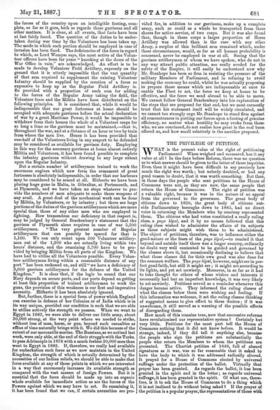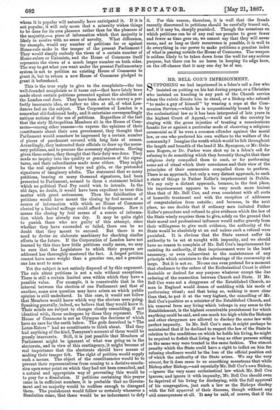THE PRIVILEGE OF PETITION.
WHAT is the present value of the right of petitioning Parliament/ When weighed and measured, has it any value at all In the days before Reform, there was no question as to what answer should be given to the latter of these inquiries. Even then it might have been difficult to say precisely how much the right was worth ; but nobody doubted, or had any good reason to doubt, that it was worth something. Bat then, in those days the people who sent petitions to the House of Commons were not, as they are now, the same people that return the House of Commons. The right of petition was a valuable right, because it was in the nature of an appeal from the governed to the governors. The great body of citizens down to 1830, the great body of citizens out- side Parliamentary boroughs down to 1885, had no direct voice in returning the Members who by courtesy represented them. The citizens who had votes constituted a really ruling class, a pays legal, and it by no means followed that this ruling class wished to administer the affairs of its subjects as those subjects might wish them to be administered. The object of petitions, therefore, was to influence either the good-nature or the fears of the pays legal,—to remind it that beyond and outside itself there was a larger country, ordinarily no doubt very well contented to be guided and governed by the classes above it, but occasionally declining to believe that what those classes did for their own good was also done for the common welfare. The pays legal, however, might err in per- fect good faith, but still it might err ; it might act according to its lights, and yet act unwisely. Moreover, in so far as it had to take thought for others of whose wishes and interests it necessarily had but an imperfect knowledge, it was very likely to act unwisely. Petitions served as a reminder whenever this danger became active. They informed the ruling classes of what the classes below them were wishing and feeling. If this information was welcome, it set the ruling classes thinking of suggested means to give effect to these desires ; if it was unwelcome, it still served as a warning of the possible effects of disregarding them. How much of this remains true, now that successive reforms have revolutionised our representative system? Certainly but very little. Petitions for the most part tell the House of Commons nothing that it did not know before. It would be strange, indeed, if they did tell it anything else, bemires the people who sign the petitions are substantially the people who return the Members to whom the petitions are presented. The Chartist petition of 1848, full of absurd signatures as it was, was so far reasonable that it asked to have the body to which it was addressed radically altered. It prayed for a House of Commons elected by universal suffrage under the protection of the ballot. Virtually that prayer has been granted. As regards the ballot, it has been granted in the spirit and in the letter ; as regards universal suffrage, it has been granted in the spirit. Of what use, there- fore, is it to ask the House of Commons to do a thing which it is not inclined to do without being asked I If the prayer of the petition is a popular prayer, the representatives of those with whom it is popular will naturally have anticipated it. If it is not popular, it will only mean that a minority wishes things to be done for its own pleasure rather than for the pleasure of the majority,—a piece of information which that majority is likely to receive with no sense of novelty. What difference, for example, would any number of petitions for or against Home-rule make in the temper of the present Parliament I They would simply embody the views of a certain number of Home-rulers or Unionists, and the House of Commons itself represents the views of a much larger number on both sides. The way to get what you want under the present Parliamentary system is not to petition an existing House of Commons to grant it, but to return a new House of Commons pledged to grant it beforehand.
This is the true reply to give to the complaints—the too well-founded. complaints as it turns out—that have lately been made about certain petitions presented against the abolition of the London coal does. They have been shown to convey a per- fectly inaccurate idea, or rather no idea at all, of what Lon- doners feel on the subject. The Corporation of London is a somewhat old-fashioned body, and it entertains correspondingly antique notions of the use of petitions, Regardless of the fact that the sixty Metropolitan Members sit in the House of Com- mons—among other reasons—to express the opinions of their constituents about their own government, they thought that Parliament would somehow be impressed by a certain number of pieces of parchment covered with long lists of names. Accordingly, they instructed their officials to draw up the neces- sary petitions, and to procure the necessary signatures. Having given these orders, they thought that their duty was done. They made no inquiry into the quality or genuineness of the signa- tures, and their subordinates made none either. They might be the real signatures of boys and girls, or the pretended signatures of imaginary adults. The statement that so many petitions, bearing so many thousand signatures, had been presented to Parliament, seemed to them a statement behind which no political Paul Pry could wish to intrude. In the old days, no doubt, it would have been expedient to treat this
matter with great seriousness. Then the falsification of petitions would have meant the closing by foul means of a source of information with which no House of Commons elected by a limited suffrage could afford to dispense. Now it means the closing by foul means of a source of informa- tion which has already run dry. It may be quite right to punish those who are guilty of this attempt, since whether they have succeeded or failed, there can be no doubt that they meant to succeed. But there is no need to devise an elaborate machinery for checking similar efforts in the future. If the Corporation of London have not learned by this time how little petitions really mean, we may be sure that the Legislature to which their prayers are addresed has thoroughly mastered the fact. A forged petition cannot have more weight than a genuine one, and a genuine one has next to none.
Yet the subject is not entirely disposed of by this argument. The rule about petitions is not a rule without exceptions. There is still a certain limited area within which they have a possible value. For example, it is conceivable that in the Interval between the election of one Parliament and that of another, some new question may have arisen on which public opinion is still undeclared. In this case, it would not follow that Members would know which way the electors were going. Speaking generally, indeed, we believe that they would know it. Their minds are subject to changes closely resembling, if not identical with, those undergone by those they represent. The House of Commons is not an Olympus the denizens of which have no care for the earth below. The gods described in " The Lotos-Eaters "'had no constituents to think about. Had they had anything of the kind, Tennyson's account of them -would be grossly inaccurate. Still, it is just possible that Members of Parliament might be ignorant of what was going • on in the electorate, and in view of this contingency, it might become of teal importance that the electorate should have means of making their temper felt. The right of, petition would supply such a means. The object of the constituencies would be to prevent their representatives from coming to a decisive conclu- sion upon some point on which they had not been consulted, and a natural and appropriate way of preventing this would be to pray for a dissolution. If petitions containing this prayer came in in sufficient numbers, it is probable that no Govern- tnent and no majority would be reckless enough to disregard them. The punishment would follow so certainly whenever a dissolution came, that there would be no inducement to :defy it. For this reason, therefore, it is well that the frauds recently discovered in petitions should be carefully traced out, and, if it may be, sharply punished. Though the occasions on which petitions can be of any real use promise to grow fewer and fewer as time goes on, we cannot say that they will never recur, and so long as their recurrence is possible, it is •well to do everything in our power to make petitions a genuine index of what is passing outside the House of Commons, The weapon is seldom likely to be taken down from the wall for any serious purpose, but there can be no harm in keeping its edge keen, on the off-chance that it may one day be of use.



















































 Previous page
Previous page